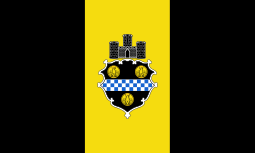William N. McNair
William N. McNair (November 7, 1880 – September 13, 1948), served as the 49th Mayor of Pittsburgh, Pennsylvania from 1934 to 1936.
Early life
Originally from Middletown, Pennsylvania,[1][2] McNair graduated from Gettysburg College in 1900, earned a law degree from the University of Michigan in 1903, and became an attorney in Pittsburgh in 1904.[3] He tried his hand at politics several times,[2] losing successive elections before finally winning office.
Pittsburgh politics
At the city's highest office in 1934, it was soon apparent though why McNair had never won a public office before. McNair almost from the beginning had a confrontational relationship with City Council. At first much of his antics were viewed as the actions of a man that cared about the "little guy"; soon though much of his actions just ground the city's ability to govern to a halt in heated, endless and dramatic debate over the most nuanced issues. During his fractious leadership McNair even set up his office in the ornate lobby of the City-County Building to display his "independence" from council and the city bureaucracy.[2]
He continued to be a lightning rod during his administration, being arrested at one point for refusing to return what a judge found to be an unlawful fine he had assessed a citizen. On November 27, 1934 Governor George Earl cut off funds to the city after continued difficulty dealing with McNair.[4] Later when he received word that the governor was considering impeachment proceedings against him he installed a bed in the mayor's office and conducted press conferences from it. In 1936, he traveled to Washington, D.C., and took part in congressional hearings on taxes. His position of repealing all federal taxes at the time was voiced so zealously that a New York Times report recounts a Capitol Police Officer was called before McNair voluntarily left the hearing.
The most fateful event for his political career took the city by force on St. Patrick's day 1936 when it suffered from the worst flooding in its history. The event and the chaotic nature that McNair had plunged the city into sealed his fate. Political opponents accused him of impropriety in various dealings, and he was jailed for three days in April on charges of operating a numbers game.[5]
He resigned on a whim on October 6, 1936,[6] promptly rescinded his resignation then demanded to once again be sworn in as mayor, but by that time the city council and the rest of the city had grown tired of his controversial leadership, choosing instead to validate his earlier resignation and let Cornelius Scully assume the mayor's office.[7]
Later life
McNair became a sort of political sideshow after he left office, continuing to run for offices unsuccessfully and giving political speeches and rallies for various causes. He died in St. Louis, Missouri in 1948 during a political rally and is buried in Allegheny Cemetery in Pittsburgh.
References
- ↑ "McNair Candidate for Governorship". The Star and Sentinel. Gettysburg, Pennsylvania. February 24, 1934. Retrieved January 26, 2014.
William N. McNair, formerly of Middletown, Dauphin county...
- 1 2 3 Murphy, Michael (January 2, 2014). "The Mayors of Pittsburgh". Brookline Connection. Clint Burton. Retrieved January 26, 2014.
- ↑ "Graduate in Race for Mayoralty Post". Gettysburg Times. November 8, 1933. Retrieved January 26, 2014.
McNair was graduated from Gettysburg college in the class of 1900.
- ↑ "Pittsburgh Loses All Cash Relief; Governor Earle Halts Such Aid After McNair Refuses to Help WPA Work Program". New York Times. November 29, 1935. Retrieved January 25, 2014.
- ↑ "Mayor M'Nair fails to get radio gong", The New York Times. April 20, 1936. Page 4.
- ↑ Barcousky, Len (April 18, 2010). "Eyewitness 1936: Unprecedented -- a Pittsburgh mayor resigns without being indicted!". Pittsburgh Post-Gazette.
- ↑ Catledge, Turner (April 1, 1936). "PITTSBURGH MAYOR A TAX-BILL REBEL; McNair Quits Room First After Defiance Upsets Hearing and a Policeman Is Called. SET OUT TO STIR UP A ROW Congress Aims at Corporation Surpluses, He Says -- Wants All Federal Levies Banned. PITTSBURGH MAYOR A TAX-BILL REBEL". New York Times. Retrieved August 14, 2008.
External links
- "McNair 'Fires' Playboy, Asks Prayers for Him". The Pittsburgh Press. January 11, 1934. Retrieved January 25, 2014.
- "Attack Story Holds Florig, Police Judge; McNair Plays Role of Attorney as Pair Face Squire". Pittsburgh Post-Gazette. April 16, 1936. Retrieved January 25, 2014.
- Post-Gazette article
- Reading Eagle article
- Works by or about William N. McNair at Internet Archive
| Political offices | ||
|---|---|---|
| Preceded by John Herron |
Mayor of Pittsburgh 1934–1936 |
Succeeded by Cornelius Scully |
| Party political offices | ||
| Preceded by Samuel Schull |
Democratic nominee for U.S. Senator from Pennsylvania (Class 1) 1928 |
Succeeded by Joe Guffey |
